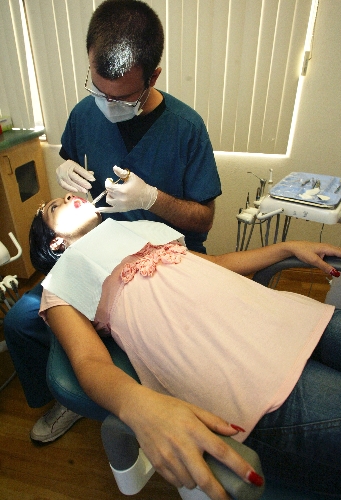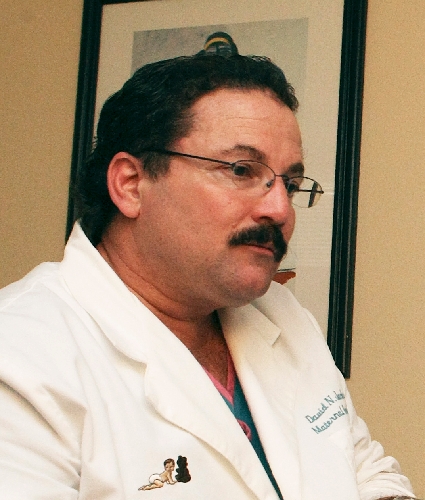Women warned about gum disease
Well before she became pregnant, Yulisdey Lopez already knew that gum disease could cause a baby to be born prematurely.
As part of her introduction to On-Site Dentistry, where she has long received her dental care, she said dentists and hygienists explained the importance of oral hygiene, citing studies that have associated oral bacteria not only with premature babies but also heart disease.
"I've made sure I took care of myself," the 5-months-pregnant Bally's dealer said Thursday before having a cavity filled. "What they were telling me sounded serious."
If that sounded serious, what On-Site staff is beginning to share with patients is even more so: For the first time a researcher has linked pregnancy associated gum disease to the death of a fetus.
The research is discussed in the February issue of "Obstetrics & Gynecology."
"Too often we don't take oral hygiene seriously enough. We think it's just about bad breath," said Chris Davenport, a dental hygienist and the chief executive officer of On-Site Dentistry . "But I think there are some studies out there that can't be ignored."
On-Site Dentistry offers services in Las Vegas both at offices as well as through mobile facilities.
Yiping Han, a researcher from the Department of Periodontics at the Case Western School of Dental Medicine, said women around the country definitely aren't ignoring her recent study suggesting that a mother's gum disease can put her baby's life at risk.
"I've even received calls from women who had stillborn births who have been trying for years to understand what might have went wrong," Han said in a recent phone call from her Cleveland office. "They remember now they had serious gum disease."
Han said she and colleagues had conducted earlier research with mice that showed an oral bacteria could spread from the bloodstream to the placenta, causing pre-term labor and stillbirths.
Han said she received a phone call in 2008 from a friend of a California woman who was searching for a reason for her baby's stillbirth.
The caller said the woman had become familiar with Han's research through the Internet, and wondered if what occurred in animal studies was also possible in humans.
Han learned that the woman had experienced heavy bleeding in her gums, a sign of gum disease.
(About 75 percent of pregnant women experience gum bleeding due to hormonal changes during pregnancy, which usually can be treated by simply flossing and brushing more often.)
After questioning the woman, whose full-term baby was born dead at St. John's Health Center in Santa Monica, Han arranged to have plaque samples collected.
Through DNA cloning techniques, Han found a match in the bacterium in the mother's mouth with the bacteria found during post-mortem studies of the baby's lungs and stomach.
Han said bleeding associated with the woman's gingivitis allowed the bacteria -- generally restricted to the mouth because of the body's immune system -- to enter the blood and to reach the placenta.
Han said a mother's immune system normally handles the bacteria before it can get that far. But a few days before the stillbirth, the woman experienced a mild upper respiratory infection with a low grade fever.
"The upper respiratory tract infection might have weakened the mother's immune system enough to provide a window of escape for the bacteria to colonize in the uterus," Han wrote in her case study.
Han's findings are being scrutinized by researchers across the country, including at the University of Nevada School of Medicine and at the University of Nevada, Las Vegas School of Dental Medicine.
Dr. Robert Lockhart, a specialist in periodontics at the dental school, and Dr. David Jackson, a specialist in maternal and fetal medicine at the medical school, both caution women about being overly concerned by Han's research.
"We're talking about just one case here," Lockhart said.
Jackson said that although women should take note of Han's findings, the even bigger story regarding oral health and childbirth remains the correlation between gum disease and pre-term or low-weight births.
Studies have largely shown that women with gum disease have between five and 12 times the chance of delivering a pre-term or low-weight baby, Lockhart said.
Researchers say a woman's body reacts to infections in the gums by producing prostaglandins, a natural fatty acid involved with smooth muscle contraction and inflammation control.
When a woman is pregnant, the level of prostaglandins increases, peaking when she is labor.
Scientists theorize that if extra prostaglandins are produced as a reaction to gum infection, a woman's body may interpret it as sign to go into labor and the baby is born too early.
Jackson said not only can a pre-term baby cost hundreds of thousands of dollars to care for in special hospital units, birth defects can occur when a baby isn't carried to term.
"The whole question of gum disease and unborn babies is understudied," Jackson said.
Though earlier studies showed that treatment for gum disease during pregnancy could help end pre-term labor, later studies have shown that it is not helpful.
"You may have to fix it (gum disease) before pregnancy," said Dr. Joshua Copel, a Yale University childbirth specialist. "Recent studies aren't showing a benefit of treatment during pregnancy, but the association between gum disease and premature labor is still there."
Medical specialists have long been concerned about how much dental care pregnant women can receive, often recommending that major dental treatments that aren't urgent and require medication be postponed until after a baby is born.
Because the first trimester is the stage of pregnancy most crucial to a baby's development, dentists often wait until the second trimester to do procedures.
It is unclear just how widely the medical establishment is getting the word out about the potential effects of gum disease and the unborn.
Dr. Richard Chudacoff, a Las Vegas OB-GYN, said most physicians in his field only bring it up if a woman appears to have gum disease.
Norma Dominguez, a pregnant front office supervisor for the School of Medicine, said until she had a recent conversation with Dr. Jackson at the medical school, she was unaware of any connection between oral bacteria and pregnancy complications.
Neither her own doctor nor her dentist has ever discussed how gum disease could influence childbirth, she said.
"I lost a baby once. I think doctors and dentists should inform women of every risk regarding an unborn child. Believe me, it's something every woman wants to know."
Contact reporter Paul Harasim
at pharasim@reviewjournal.com or 702-387-2908.





























